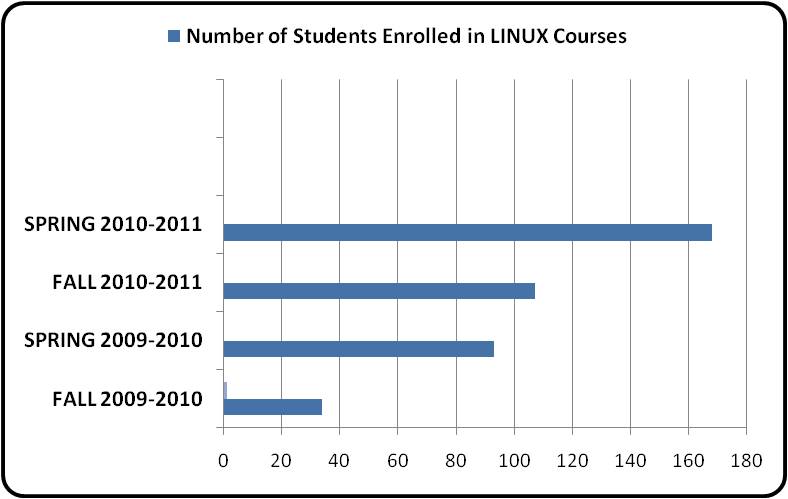By KIMBERLY ROSS
The LINUX System Administrator Certificate Program at St. Petersburg College (SPC) has increased its course availability to seven sections beginning Jan. 10 for spring semester.
Professor Therezita Ortiz, who piloted the original courses in 2002, said there has been much growth and demand within the LINUX program in recent years. A LINUX Foundation Survey found that LINUX “is poised for growth in the coming years; 76.4% of companies are planning to add more LINUX servers in the next twelve months.”
This growth also reflects the growth experienced in the use of UNIX/LINUX systems in the workplace.
(SPRING 2010-2011 based on Projected Enrollment)
According to Professor Ortiz, the LINUX Program “is designed for individuals who are planning to use LINUX and/or UNIX as their choice of an operating system either for professional and/or personal use.”
At SPC, LINUX is taught in an eight-week online format. This modality allows students to be part of a cohort structure. They are introduced to UNIX/LINUX by enrolling in CTS 2106 Fundamentals of the LINUX/UNIX Operating Environment as the introductory course, followed by CTS 2321 LINUX System Administration I and CTS 2322 LINUX System Administration II to expand their knowledge of the operating system’s server features.
In all three courses, students are introduced to the concept of virtualization through the use of VirtualBox (an open source virtualization program). This allows the students to install UBUNTU (the LINUX distribution currently used in these courses) on their PC from within Windows, thus eliminating the need for a second dedicated PC to use with UBUNTU.
This setup affords students the opportunity to complete their assigned coursework using the same computer they use for other courses where Windows applications are required.
Ortiz said the majority of students enrolled in LINUX System Administration I and LINUX System Administration II courses have expressed interest in the courses for “self-improvement and/or enhancing their current work related skills.”
Having this cohort structure “creates continuity with the instructor and students, thus enhancing the learning environment,” Ortiz said. Also, students benefit from these courses when enrolled in other computer related courses. As a student shared with Ortiz, “I was pleasantly surprised to find that much of what I learned in this course about operating systems in general, and how they work, was very helpful to me with my upper level computer science courses.”
The best way to succeed in the course is to read carefully, Ortiz said. Attention to detail is an important skill in this program, in collegiate education and at work.
“We look forward to seeing you in class,” Ortiz said.

